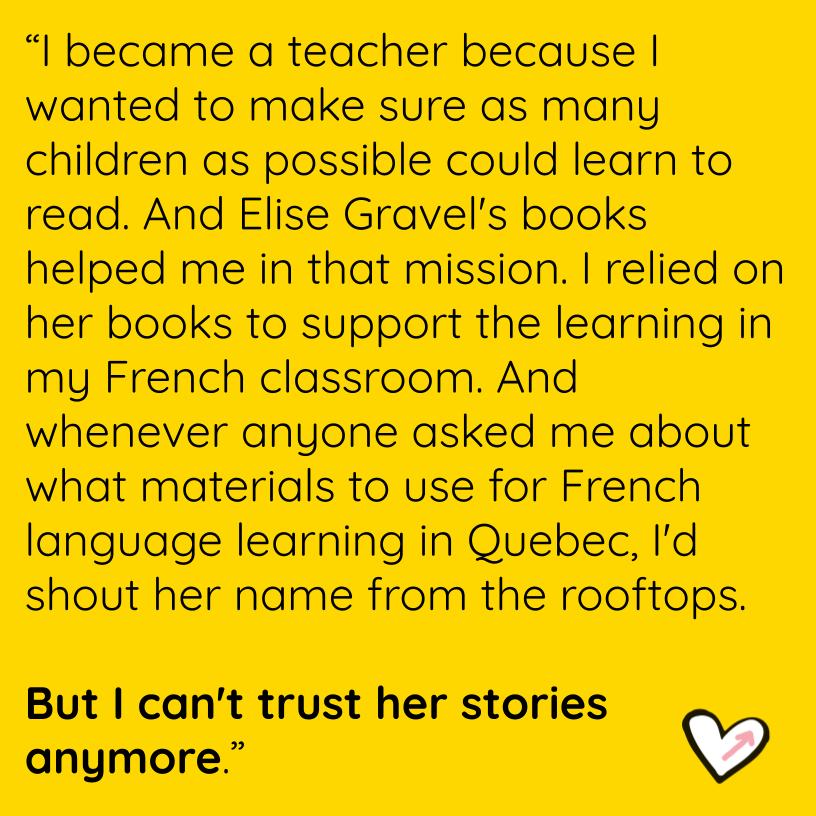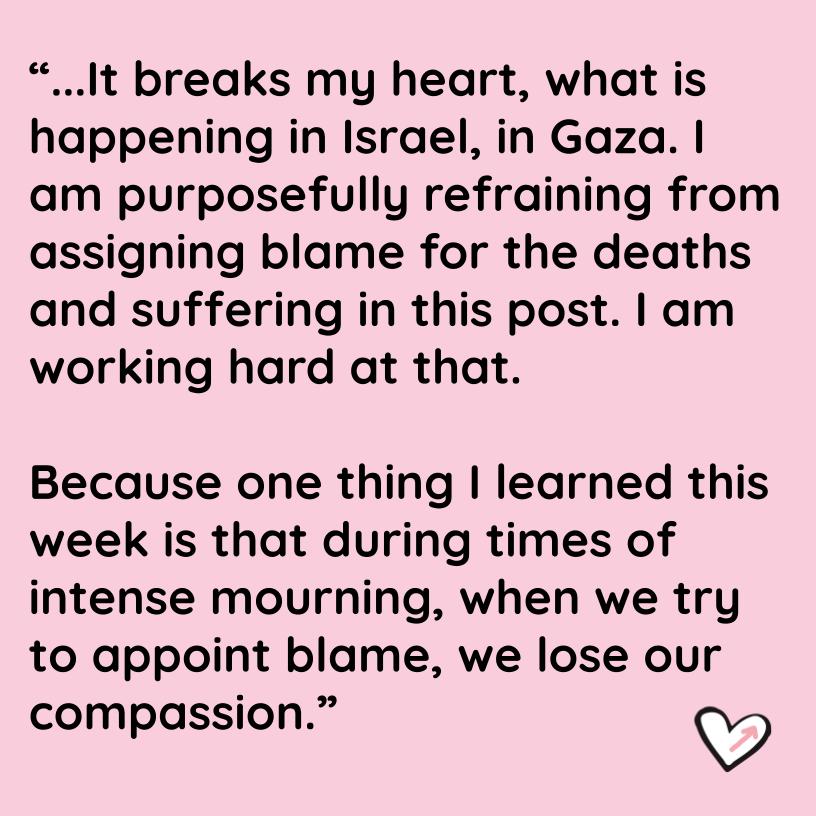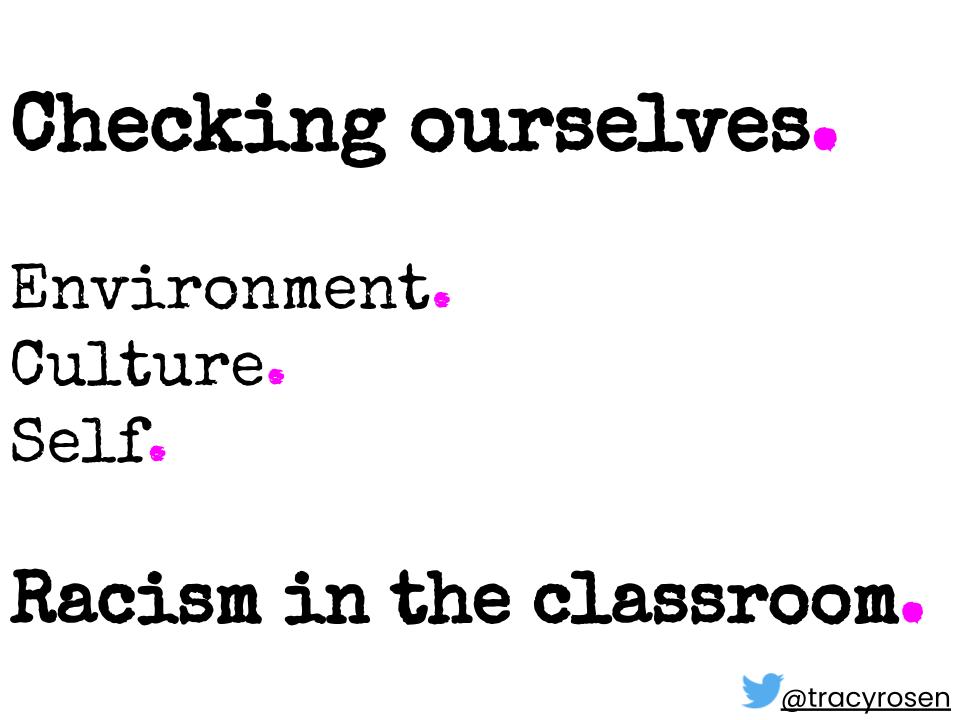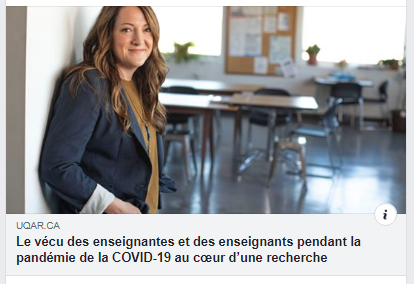I became a teacher because I wanted to make sure as many children as possible could learn to read. And Elise Gravel’s books helped me in that mission. I relied on her books to support the learning in my French classroom. And whenever anyone asked me about what materials to use for French language learning in Quebec, I’d shout her name from the rooftops. But I can’t trust her stories anymore.
I wasn’t alone in trusting my child’s and my students’ learning to Elise Gravel’s storytelling. Parents and teachers around Quebec, and likely around the world, did the same. Children love her characters and the way she tells her stories. And that is what makes this blog post all the more important for me to write. Because the stories she is telling have changed.
I’ve been thinking about this post since sometime in October. I didn’t write it then because I was still reeling and in shock about some of the things people I admired were saying, and not saying, about the events of October 7 and everything that has been happening over the past 88 days since.
This post has been written in spurts, mostly dictated, over the past few weeks in an attempt to get the words out yet keep them straight as I do so. My brain is recovering from a concussion after a fall on December 7 (since when is 7 a lucky number? That has been forever changed.) My mind is filled with words that need to get out.
For the past 70 (now 88) days, I have heard people repeat information that has been designed specifically to turn others against Jews. You know we’ve seen this before. It’s nothing new but it’s new for us because it always existed in history. Kind of. I say kind of because in my lifetime I’ve been called a dirty Jew when someone didn’t like that I wasn’t playing with them when I was a child. I’ve been referred to as a Jew when it has to do with money. I’ve been in conversations where people use the term Jew as a, well, not as a compliment (I will always remember the look on my boss’ face when he realized what he said and that I was at the table.) But as I grew up, those kinds of things were somewhat rare. Not as bad as when my parents were growing up, and certainly not as bad as when their parents and all of our ancestors in a long line across millennia were.
But now it’s become the norm. It’s like it’s okay. It’s just okay to say things against Jews against Israelis against Zionism (in quotes) because we’re now being painted as the bad guys and it’s hilarious almost, if it weren’t so horribly sad and scary. Hilarious because we’ve seen this happen before and those who are doing it now, don’t realize that they aren’t doing anything new.
So. What’s going on with Elise Gravel? I used to love everything she did, everything she wrote. My son and I would read as many of her books as we could together. That’s how he learned how to read in French, through her books. But now I am seeing a new kind of storytelling that she is doing about an area of the world to which she has no connection (as far as I know,) to which she has no blood memory. She seems to be using this area of the world as a place around which to organize her thoughts, her very specific and hateful thoughts that are laced with antisemitic imagery. And before you start saying oh those Jews anytime you criticize them they start to cry antisemitism…

If she were only criticizing decisions of the Israeli government and not also invoking blood libel imagery then there would be no need to use the word antisemitism.
If she were only criticising the Israeli government and not also invoking images of manipulation and power and money, then there would be no need to use the word antisemitism. (This is in reference to a comic she wrote that portrays Israel justifying itself as a big bully and when Palestine kicks it in the shins, it cries for help and the US and EU come running with weapons and money. You can see it here in English and here in French. And you can visit her Instagram and Facebook accounts for more examples of what I describe here.)
If she were to take into account the publicized videos of Hamas saying that their goal is to recreate October 7, over and over again until the Jews are gone, then there would be no need to use the word antisemitism. (In fact, she refers to what happened on October 7 as a kick in the shins in the comic I linked to above… )
But she isn’t commenting on any of that. She is solely focused on amplifying the idea that Israel is bad, that Israel is a bully, and that anyone who doesn’t believe so is responsible for the deaths of children. She is manipulating people’s emotions around the safety of children and because she is such an influential storyteller, she is manipulating people against Israel (in fact, she’s collecting stories about how and why people turned against Israel) and we have seen what that kind of manipulation does when it happens in the media. Even here in Montreal, Jewish schools and community organizations have been targets of hate crimes. People targeted Jewish institutions and their menorahs on Chanukah. People were told oh you can’t wish others a happy Hanukkah because that’s too political. People have been targeted, maimed, and killed around the world, outside of the war zone – Jews and Palestinians alike (you can find those references on your own, there are so many). The victims of those crimes don’t care if they were being done in the name of antisemitism or antizionism. The result is the same. Don’t insult us with trying to explain there is a difference.

Elise Gravel isn’t fighting for Palestinian rights in the way she may think she is. Instead, she is repeating very classic tropes about evil, manipulative, powerful Jews (today’s keywords are evil Israel, evil Zionist, evil colonizer) that have been constructed throughout history as a way to blame us for the world’s problems. But…”When everything is a construct, nothing is a fact.” (Eve Barlow, December 17, 2023) so Elise Gravel isn’t shedding light on any new facts, she isn’t doing anything special besides falling into one of the world’s oldest hatreds. Bravo.
BUT when it comes down to it, It is seriously messed up to tell these limiting, very small piece of the puzzle kinds of stories to children. And as a children’s author, you can guarantee they are listening to you tell these stories about a war in an area of the world to which you have no connection. You are manipulating them into believing along the lines of your own limiting beliefs, rife with antisemitism, and that is terrifying for me as a mother and as a teacher.
And I will say once again and forever – yes, it is antisemitism when you call upon centuries old tropes like blaming Jews for the deaths of children and painting Israel, and Jews by association (close to half of the world’s 15 or so million Jews live there,) as having more power than they do. It’s classic antisemitism – The same tropes were used by the Romans, they were used in Spain during the inquisition, and they were used by that man with the miniscule mustache. And more recently they are being used again by so many, including Elise Gravel.
Postscript.
And we are now starting to see some consequences of spreading this kind of hatred. It really isn’t cool. I learned about this lawsuit last night:
“The victory underscores that there will be legal repercussions for those who defame Jewish people, under the guise of ‘Palestinian advocacy,’” said Brooke Goldstein, founder and Executive Director of The Lawfare Project. “We are proud to have facilitated the legal representation of Shai DeLuca, who bravely stood up against bigotry and hatred, and who won a significant victory in court against Jew-hatred. The defendant in this case spread an intentional and vicious blood libel against the Jewish state, and against Mr. DeLuca because he is Jewish. With our legal victory we have set an important precedent in Canada that such falsities have no place in our democracy, and anyone who likewise disseminates Jew-hatred will be held accountable.”
The Lawfare Project Announces Significant Victory In Defamation Lawsuit Before Ontario Superior Court Of Justice
If you want some guidance in how to navigate this mess of a situation without falling into age old Jew hatred or Islamophobia, here are some resources you can look at.
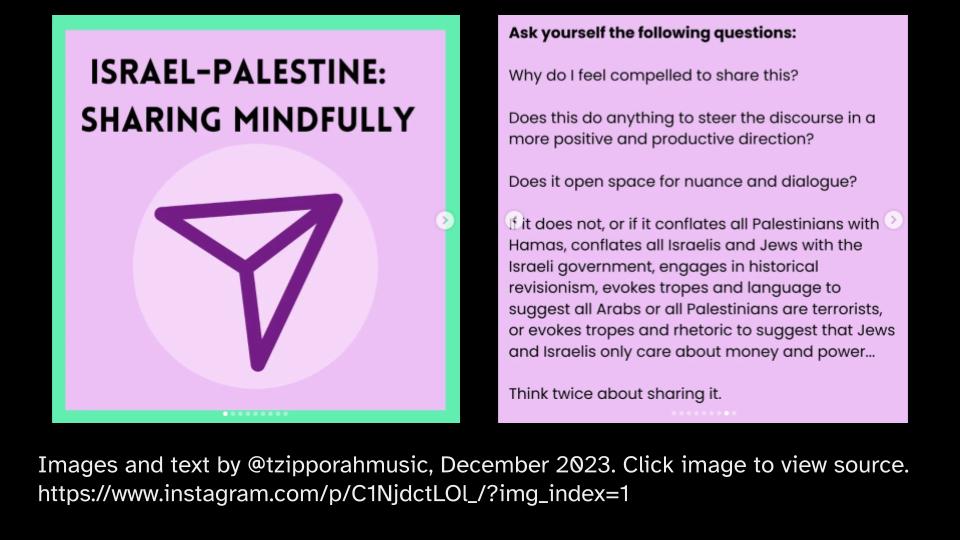
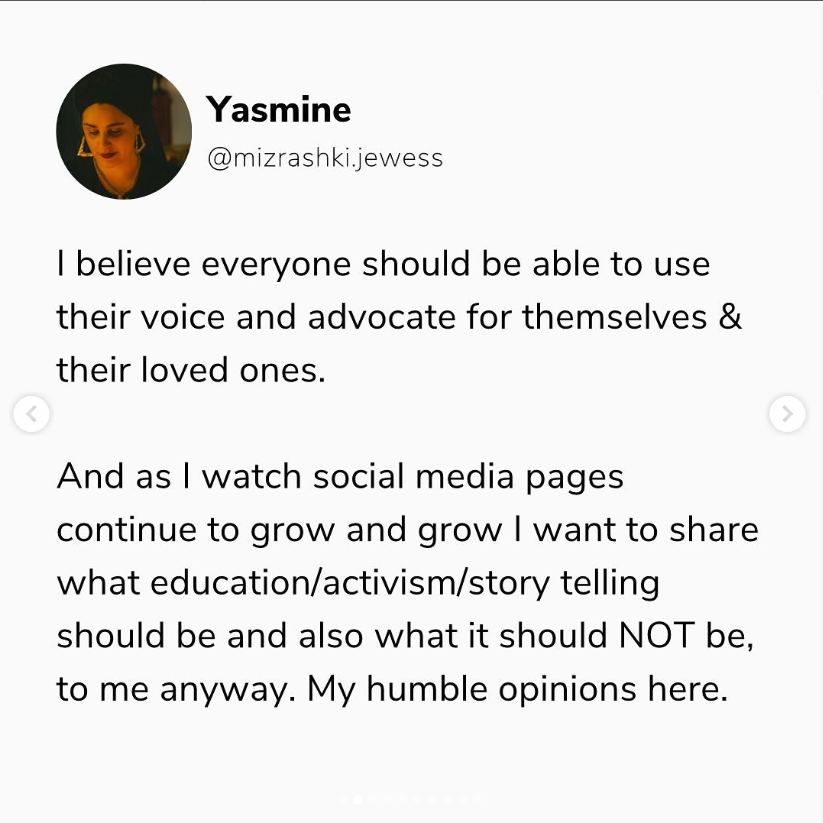
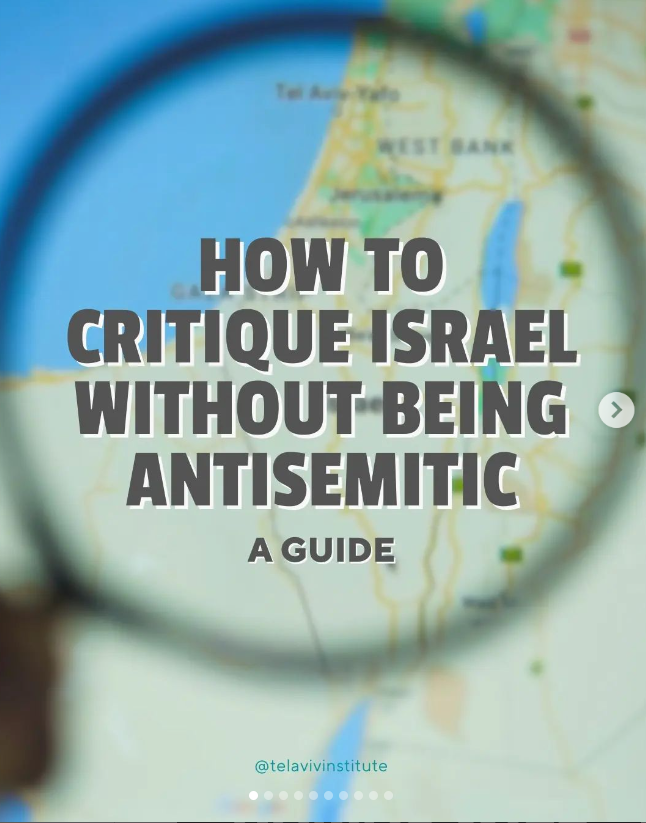
If you’d like to explore this mess without falling into a sports match kind of binary, Unapologetic: the Third Narrative is an excellent place to start.
And finally –> The truth about stories is that’s all we are (Thomas King.) What kinds of stories do you share during difficult times?

